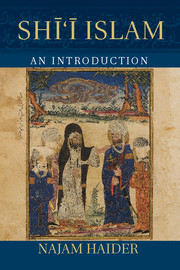Book contents
- Frontmatter
- Dedication
- Contents
- List of Tables and Maps
- Acknowledgments
- Note on the Cover Image
- A Note on Transliteration and Dating
- Maps
- Introduction
- Section 1 Theology
- 1 ‘Adl (Rational Divine Justice)
- 2 Imāmate (Legitimate Leadership)
- Section 2 Origins
- Section 3 Constructing Shī‘ism
- Section 4 Shī‘ism in the Modern World
- Appendix Verses Mentioned in the Argument from Qur’ānic Expectations in Chapter 3
- Index
- References
1 - ‘Adl (Rational Divine Justice)
Published online by Cambridge University Press: 05 August 2014
- Frontmatter
- Dedication
- Contents
- List of Tables and Maps
- Acknowledgments
- Note on the Cover Image
- A Note on Transliteration and Dating
- Maps
- Introduction
- Section 1 Theology
- 1 ‘Adl (Rational Divine Justice)
- 2 Imāmate (Legitimate Leadership)
- Section 2 Origins
- Section 3 Constructing Shī‘ism
- Section 4 Shī‘ism in the Modern World
- Appendix Verses Mentioned in the Argument from Qur’ānic Expectations in Chapter 3
- Index
- References
Summary
All Muslims believe that God is just. They differ, however, about the meaning and implications of this simple, succinct statement. The dominant Sunnī position (adopted from Ash‘arī theology) defines justice through God's actions and commands. These actions and commands are not bound by any human understanding of justice and can be understood only through revelation. Although it is possible to forward a rationale for a given divine command, such an endeavor is speculative, and its results are entirely conjectural. If a command seems reasonable, this is the product of mere coincidence. In the end, God is just by definition, and His actions and commands need not accord with human reason.
By contrast, most of the Shī‘a (relying on Mu‘tazilī theology) contend that God is just in a manner that can be rationally understood by human beings. It is possible to ascertain the reasons for God's actions because they must align with human notions of justice. Divine commands must likewise accord with the basic postulates of reason. Cases in which explanations are not evident result from a failure to apply reason in an adequate manner. God is just, and this justice is rationally intelligible.
- Type
- Chapter
- Information
- Shi'i IslamAn Introduction, pp. 18 - 30Publisher: Cambridge University PressPrint publication year: 2014

